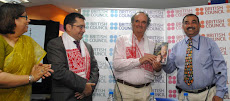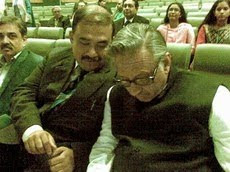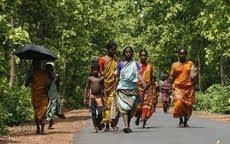 Maoist party and Gunen Singh on behalf of the PLA signed on the memorandum. The Maoists recognised Manipur's right to independence - the PLA agreed not to attack the "Indian proletariat" (sarbohara). That means the PLA agreed not to attack poor wage labourers and brick kiln workers from Bihar and other Hindi speaking states who work in Manipur. The Maoists acepted the Manipur's right to self determination .
Maoist party and Gunen Singh on behalf of the PLA signed on the memorandum. The Maoists recognised Manipur's right to independence - the PLA agreed not to attack the "Indian proletariat" (sarbohara). That means the PLA agreed not to attack poor wage labourers and brick kiln workers from Bihar and other Hindi speaking states who work in Manipur. The Maoists acepted the Manipur's right to self determination .Similar negotiations have been now initiated with the ULFA. Senior Maoist leaders have visited the state and have had discussions with the ULFA. The reason why there has been no memorandum of understanding after these discussions is because the ULFA has so far refused to agree to the Maoist condition that they will not attack the "Indian proletariat" in Assam - meaning the ULFA's attacks on Hindi-speaking poor people must stop before a deal is possible.
It is not difficult to see why the Maoists would insist on such a condition. They have a strong support base in mainland Hindi speaking states amongst the poor people whose relatives have come to Assam looking for work. If the ULFA kills these people, the Maoists would loose support among the mainland Indian poor class in Hindi speaking states if they have links with ULFA.
 The Maoists are the first Indian political force who have come forward to recognise the right to self determination for the people of Kashmir and Northeast. This is to create a favourable condition for their political inroads in this region. They know very well that in most northeastern states, the separatist insurgencies are getting weaker. If they generally take a favourable stand on the nationality question (jattisattar prasango), they think the people of Northeast will be favourable to support them in case they dont have a popular local insurgent force in their area.
The Maoists are the first Indian political force who have come forward to recognise the right to self determination for the people of Kashmir and Northeast. This is to create a favourable condition for their political inroads in this region. They know very well that in most northeastern states, the separatist insurgencies are getting weaker. If they generally take a favourable stand on the nationality question (jattisattar prasango), they think the people of Northeast will be favourable to support them in case they dont have a popular local insurgent force in their area.+and+Sasha+Choudhury+in+Guwahati+on+Saturday_07112009.JPG) That kind of an assessment is not wrong. But what will get the Maoists in trouble is the class question - the growing gap of rich and poor that is sharply increasing in the Northeast. Since this gap is increasing, it will be impossible for a Maoist party not to raise the issue. But the moment that is done, most separatist guerrilla forces in the Northeast - surely their leadership - may not like the Maoists. They would argue that the class question would dilute the unity in their societies that is crucial for a separatist struggle.
That kind of an assessment is not wrong. But what will get the Maoists in trouble is the class question - the growing gap of rich and poor that is sharply increasing in the Northeast. Since this gap is increasing, it will be impossible for a Maoist party not to raise the issue. But the moment that is done, most separatist guerrilla forces in the Northeast - surely their leadership - may not like the Maoists. They would argue that the class question would dilute the unity in their societies that is crucial for a separatist struggle.It is very difficult for the Maoists and the separatist forces in the Northeast to have a genuine political understanding unless the separatist struggles are prepared to accept the class question as an important social phenomenon.
+speaks+to+the+media+before+the+release+of+Indian+police+officer+Atindranath+Dutta_22102009.jpg) That is why most separatist groups which thrive on ethnicity and religion will avoid the Maoists while forces like the PLA and the ULFA may be attracted to them. The PLA in the 1980s talked of "bringing down the bandit government of Delhi" - the ULFA talked of building communism on a nationalist base. The Maoists feel they can maintain relations with these forces. But they have problems with guerilla groups who talk of "Nagaland for Christ" or "Tripura for Christ". I have discussed these problems extensively in my forthcoming book "Troubled Periphery : Crisis of India's Northeast" published by Sage.
That is why most separatist groups which thrive on ethnicity and religion will avoid the Maoists while forces like the PLA and the ULFA may be attracted to them. The PLA in the 1980s talked of "bringing down the bandit government of Delhi" - the ULFA talked of building communism on a nationalist base. The Maoists feel they can maintain relations with these forces. But they have problems with guerilla groups who talk of "Nagaland for Christ" or "Tripura for Christ". I have discussed these problems extensively in my forthcoming book "Troubled Periphery : Crisis of India's Northeast" published by Sage.I am told Maoist leaders also met NSCN leader Muivah a few months. While Muivah talked fiercely against the Indian government for the slow progress of the Naga talks, he did not agree to break of the talks and return to the jungles. The Maoists feel that though he has not reached a settlement, he has been co-opted into the Indian system and cant break off from the talks even if he gets nothing.
So the Maoists will pick and choose their allies in the Northeast, regardless of whether the Indian government likes it nor not.
။ Photos : Revolutionary People's Front of Manipur, AP, Eastern Projections and Reuters
။
( Subir Bhaumik is the BBC's East India Correspondent and a known military intelligence observer )







